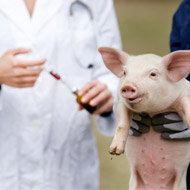RUMA disappointed over calls to ban preventative antibiotics

RUMA argues that taking away preventative treatment risks creating more severe disease problems and poor welfare.
Campaign group Responsible Use of Medicines in Agriculture (RUMA) has expressed disappointment over calls to prohibit the routine use of preventative antibiotics in animals.
Writing in the Daily Telegraph, a number of healthcare professionals urge the government to ‘immediately introduce a UK-wide ban on the routine preventative mass medication of animals and urgently curb farm use of the ‘critically important’ antibiotics’.
They add that the UK Government ‘is now in a unique position to put these recommendations into practice as part of a post-EU Referendum strategy for UK agriculture’.
Commenting, a RUMA spokesperson writes: 'This message is exceptionally disappointing considering the strong directive from those heading human and animal medicine in the UK to stop the ‘blame game’ on antimicrobial resistance (AMR) as we all work together to implement the global One Health strategy.
'In fact, this type of orchestrated rhetoric, supported by scant facts, is potentially harmful to the health and welfare of our farm animals, pets and horses.'
The open letter, published on Monday (14 November), was signed by the Faculty of Public Health, the British Medical Association, two leading health journals and heads of 12 royal medical colleges.
In its response, RUMA argues that taking away preventative treatment risks creating more severe disease problems and poor welfare.
'We need to migrate to methods of managing disease which involve lower use of antibiotics but when disease threatens, preventative treatment, sometimes of groups of animals, can be the most effective and least stressful course of action for the animals involved,' they write.
'Caring for the health and welfare of animals is a serious business and one which should not be jeopardised by poor research and avoiding responsibility.'



 The Veterinary Medicines Directorate (VMD) is inviting applications from veterinary students to attend a one-week extramural studies (EMS) placement in July 2026.
The Veterinary Medicines Directorate (VMD) is inviting applications from veterinary students to attend a one-week extramural studies (EMS) placement in July 2026.